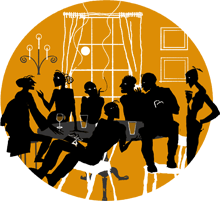Exceptionally independent? The Scottish Independence Referendum and the case for the Union
Mon, Jun 30 2014 02:09
| Permalink
7.30pm. Thursday 11th September 2014, at The Victoria, 48 John Bright Street, Birmingham B1 1BN.
Questioning the value of patriotism and nationalism, Samuel Johnson declared in 1774 that: “Patriotism is the last refuge of the scoundrel." Scottish nationalism, the Yes campaign argue, is a modern, civic nationalism, devoid of older associations with racism and jingoism. And it's not the only nationalism enjoying increasing purchase today – a recent independence march in Edinburgh, for example, was attended by Catalan nationalists who are also looking to hold their own independence referendum. The nation state, supporters of Scottish devolution argue, is in decline around the world, being increasingly replaced by autonomous states working in economic and defence federations. Many argue that these resurgent national identities need not be viewed as parochial, inward looking or conservative, but rather reflect a new spirit of integration of smaller nations into the greater whole of the European Union, which itself aspires to act as a safeguard against sectarianism and the national conflicts of old.
The discussion about Scottish independence affects more than just the Scottish electorate - it calls into question the very union created by two acts of Parliament in 1706 and 1707, which formed the nation of Great Britain we live in today. Beyond the often uninspiring and tedious practicalities of the current independence debate lie some important principles.
Some maintain that Great Britain was the first modern society based not on ethnicity or race, but on shared purpose and beliefs. Rather than being ‘formed at the end of a bayonet’, as were so many other states in the same period, it was instead a product of Enlightenment thinking which recognised shared economic and political values, and an intricately linked history.
Some maintain that Great Britain was the first modern society based not on ethnicity or race, but on shared purpose and beliefs. Rather than being ‘formed at the end of a bayonet’, as were so many other states in the same period, it was instead a product of Enlightenment thinking which recognised shared economic and political values, and an intricately linked history.
Questioning the value of patriotism and nationalism, Samuel Johnson declared in 1774 that: “Patriotism is the last refuge of the scoundrel." Scottish nationalism, the Yes campaign argue, is a modern, civic nationalism, devoid of older associations with racism and jingoism. And it's not the only nationalism enjoying increasing purchase today – a recent independence march in Edinburgh, for example, was attended by Catalan nationalists who are also looking to hold their own independence referendum. The nation state, supporters of Scottish devolution argue, is in decline around the world, being increasingly replaced by autonomous states working in economic and defence federations. Many argue that these resurgent national identities need not be viewed as parochial, inward looking or conservative, but rather reflect a new spirit of integration of smaller nations into the greater whole of the European Union, which itself aspires to act as a safeguard against sectarianism and the national conflicts of old.
Can those in favour of the union today make a valid case for maintaining it? Or is the growth of competing nationalisms the next inevitable shift in these islands' history? In the midst of British anxieties about social cohesion, what effect will the breakup of the union have? As the notion of nation states is increasingly being called into question, what does it means to be British, or indeed Scottish, today?
Speakers
Justine Brian: Justine is the National Coordinator of the Debating Matters competition for sixth form students.
Dr Joe Jackson: Teaching Fellow, University of Warwick School of English Literature and Comparative Studies, Joe teaches "Devolutionary British Fiction 1940 to the present".
Recommended Readings
Jonathan Meades in his series on Scotland “Off Kilter” says that the independent nation is a delusional state.
Brendan O’Neill links the Scottish independence campaign to the “divisive cult of identity politics” and argues there is a moral case for the Union.
Working people are beginning to see the Independence Referendum as presenting “the possibility of taking back some power for themselves,"writes Jonathan Shafi, co-founder of the Radical Independence Campaign, in The Scotsman.
Writer Alasdair Gray does not have much faith in the SNP but hopes that independence will mean in 2016 a new set of MSPs without old party allegiances will be elected who will “thoroughly and publicly debate important matters.”
Both Farage and Galloway are wrong about Scottish Nationalism, according to the Bella Caledonia online magazine, which is instead "articulating a vision for an internationalist, multicultural Scotland."
Both Farage and Galloway are wrong about Scottish Nationalism, according to the Bella Caledonia online magazine, which is instead "articulating a vision for an internationalist, multicultural Scotland."
Patrick West gives an account of the differences between the Catalan and Scottish Independence campaigns.
Comments
